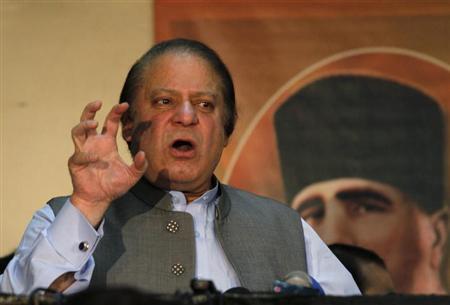
Constitutional law experts on Thursday declared an end to the virtually presidential form of government, in vogue in the country for the past 14 years, following Nawaz Sharif’s election as prime minister for a third term a day earlier.
Between October 1999 and June 5, 2013, the president’s office has remained at the helm of affairs even though a parliamentary form of government was actually in place, a system of government envisaged by the founder of the country Quaid-e-Azam.
Constitutional law experts, former Supreme Court justices Wajihuddin Ahmed and Saeeduz Zaman Siddiqui, along with former interim law minister Ahmer Bilal Soofi agree with the view that the country has once again firmly turned towards a parliamentary form of government.
Justice (retd) Wajihuddin Ahmed, who had contested the presidential election against Musharraf in 2007, said that former premiers Gilani and Ashraf were mere rubber stamps in a government controlled by Asif Ali Zardari as the President. ‘’Zardari, by virtue of being co-chairman of the Pakistan Peoples Party (PPP), subsumed all the powers of the prime minister, ‘’ said Ahmed.
The situation was similar when Jamali and Aziz held the office of the prime minister under then president Gen (retd) Musharraf. Jamali, who has recently again joined the Pakistan Muslim League Nawaz (PML-N) was more realistic and would refer to president Musharaf as his immediate boss.

Justice Saeeduz Zaman Siddiqui, who contested the presidential election against Asif Ali Zardari in 2008, agreed with his peer Ahmed and termed the two former prime ministers a “post-office.”
“It is a known fact that that President Zardari used to take all major decisions without consulting the prime ministers,” revealed Siddiqui.
International law expert and caretaker minister, Soofi concurred with his senior colleagues and said that while “constitutionally there has been a parliamentary form of government in the country, politically the presidential system was in practice,” he explained.
Experts agreed that after the passage of the landmark 18th constitutional amendment, the president is a ceremonial head of the state who is bound to act under the advice of the prime minister. The amendment has annulled the presidential powers to dismiss an elected government and dissolve the national assembly. Similarly, the president’s authority to appoint provincial governors and the services chiefs has also been transferred to the premier.
Therefore, a senior bureaucrat revealed that now President Zardari has to perform only a few functions with Nawaz as prime minister. ‘’He has a limited role to play during his remaining months in the presidency, till September,” he said. Zardari was elected to the presidency on September 6, 2008 and his five year constitutional term expires in September, 2013.
The president’s new powers are limited to giving assent to the national budget after its passage by Parliament, issuance of ordinances on the advice of the premier and address to the joint session of the parliament on the beginning of the new parliamentary year.
Published in The Express Tribune, June 7th, 2013.
COMMENTS (3)
Comments are moderated and generally will be posted if they are on-topic and not abusive.
For more information, please see our Comments FAQ




1732538123-0/BeFunky-collage-(90)1732538123-0-165x106.webp)

1732530440-5/Copy-of-Untitled-(85)1732530440-5-270x192.webp)



1732534225-0/Express-Tribune-(13)1732534225-0-270x192.webp)






What type of Democracy is India's? Neither parliamentary nor presidential! It is an usurped Democracy!
SO !!! how long it takes for this to change back to presidential form !!!!
Undoubtedly right and thanks for pointing this out.